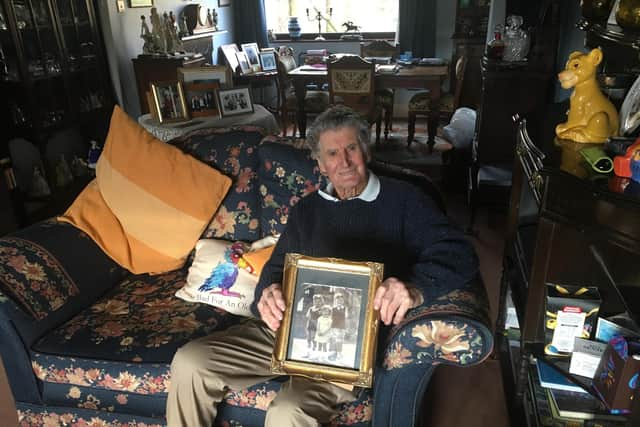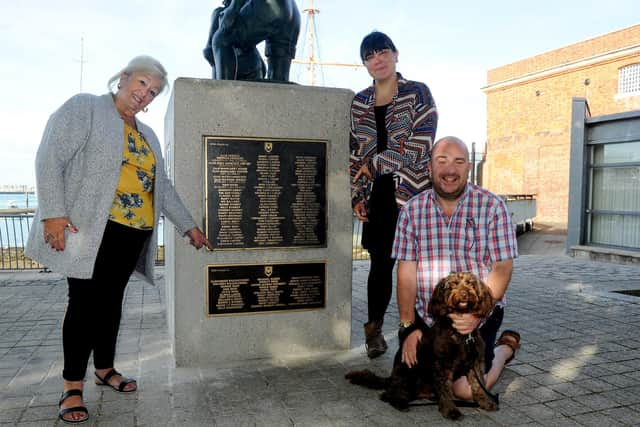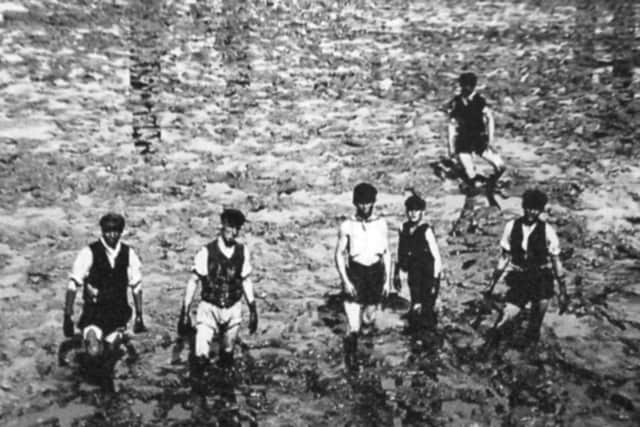Portsmouth Blitz survivor recalls bombing raids
and live on Freeview channel 276
The 86-year-old says he is the last remaining survivor from Portsea Island who endured Blitz attacks during the Second World War.
The pensioner also believes he is the only person to have been ‘bombed out’ of his home on two occasions during the ruthless onslaughts by the Nazis in 1940 and 1941.
Advertisement
Hide AdAdvertisement
Hide AdWhile the most notorious of the raids was on January 10, 1941, the bombing started in July 1940 – 80 years ago this month.


Just a young boy aged five when the first bombs thudded down while he was living in Britain Street, George said Portsea was transformed into a sea of utter devastation.
‘I remember we were bombed out of Britain Street, which was eventually devastated and flattened by numerous German bombing raids, all destined for the dockyard,’ George, who has lived in Havant for more than 40 years, recalled.
‘Looking back I realise how brave my mum was. She was only 26 at the time but had three young children; my twin brother John and my younger sister Gloria.
Advertisement
Hide AdAdvertisement
Hide Ad

‘My mum would carry us under the staircase which fortunately was made out of concrete before she collected old carpet from other bombed out houses which she used to wrap us in to stop the shrapnel and flying debris from hurting us.
‘Hours after the raid we could hear the rumble of the last German bombers in the distant sky. When we looked around, our house and countless others had disappeared. There were no homes for anyone to go to.’
George vividly remembers the moment the German bombers were approaching the harbour. ‘I remember us saying “look up here they come” as 100 German bombers came in over the sea,’ he said. ‘But we didn’t get scared, which just dived inside for cover.’
As a child, the full horror of the bombings largely went over George’s head, with him instead recalling his irritation that a Vantis machine which delivered soda in his grandparents greengrocer shop nearby was destroyed.
Advertisement
Hide AdAdvertisement
Hide Ad

‘All the children loved those drinks,’ George said. ‘Despite my grandparents losing their home, losing the Vantis machine was the biggest loss for me.’
Following the raids Portsmouth City Council came and moved the scores of now homeless people to Peterborough Road in Cosham. ‘I remember thinking that this was the end of the bombing but a few days later there were more bombs,’ George said.
‘We were in my grandmother’s makeshift shelter. There were two more bombs which exploded next to our shelter.
‘My uncle was killed, my father was seriously injured and my grandparents lost their new accommodation for the second time. One minute the house was there but then it was gone.
Advertisement
Hide AdAdvertisement
Hide Ad‘I lost friends – most were from Portsea and Gunwharf – who were younger than me. It was very sad.’
When bombings were severe, George revealed how people would make use of shelters on Portsdown Hill. ‘We would go into the tunnels and pay 6p for a bed,’ he said.
But despite the horror unfolding before the youngsters eyes, it was not something he was overly concerned with. ‘It was just something you live with. There was no point dwelling on it, you just got on with life,’ George said.
‘As a youngster I was more interested in trying to find shrapnel and getting the biggest bits possible. When you’re young you don’t worry as much about things as when you are older.
Advertisement
Hide AdAdvertisement
Hide AdGeorge also recalls a day etched in the memory of Portsmouth – January 10, 1941 – when Guildhall was bombed. ‘It was flattened,’ he said. ‘Just like everything was around where we were.’
Fortunately, that was the last time George had to witness bombings with him and his brother and sister evacuated to Westmark Camp near Petersfield where he spent the next four Christmases ‘very happy’.
Prior to the war George rose to prominence with a gang of other children who used to fool around in the mud on the harbour shore just outside of Portsmouth Naval Dockyard.
‘When the trains came in from London they would walk to the buses where we would be in the mud under the bridge,’ George recounted. ‘They would throw money to us and we would entertain them by diving around trying to find the coins.
‘It would only be 6p but it was a lot of money for us.’
Advertisement
Hide AdAdvertisement
Hide AdGeorge and his friends became known as The Mud Larkers and now have a monument on The Hard to commemorate them.
Following the war, in 1953, George went over to Guernsey where he got engaged to a young lady before having to leave the island after being called up for National Service in 1957.
George later met his ‘lovely’ wife, Doreen, who he was happily married to for 50 years before her death 21 years ago.
He worked for building firm J.C. Nichols as a supervisor for more than 30 years before working as a gardener for Portsmouth City Council for the last nine years until a heart attack last January. ‘I had worked every day of my life until then. I like to keep busy and look after myself,’ he said.
Advertisement
Hide AdAdvertisement
Hide AdAnother trait George has cultivated following the traumatic events of his childhood, is the ability to make the most of life despite what has been thrown at him.
‘I am the last one of the Portsea gang to still be alive from the Blitz – I’ve been to a lot of funerals. But I can’t grumble with my life. I’ve loved every minute of it,’ he added.
Comment Guidelines
National World encourages reader discussion on our stories. User feedback, insights and back-and-forth exchanges add a rich layer of context to reporting. Please review our Community Guidelines before commenting.